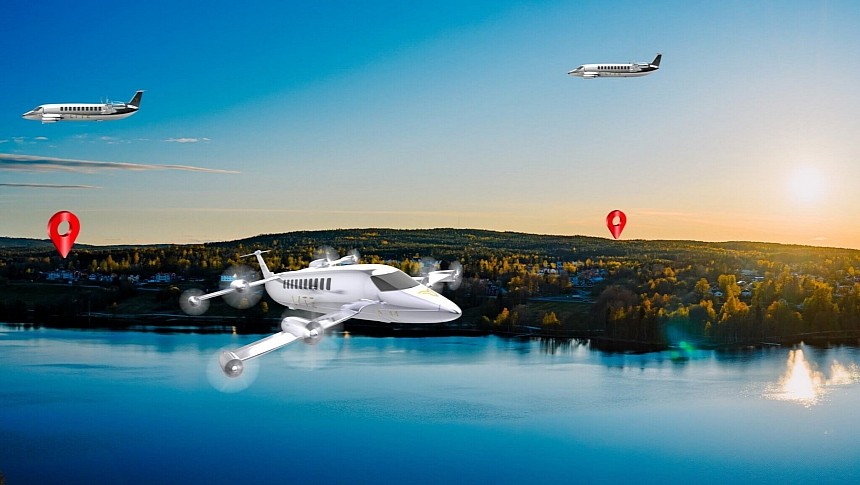A bus and a truck for the skies? Yes, it's possible, and it's what Lyte Aviation is bringing to the table. As a step forward, the impressive SkyBus and SkyTruck will be coupled with a unique infrastructure concept inspired by IKEA.
Lyte Aviation isn't wasting time. It unveiled the SkyBus and SkyTruck concepts after three years of intensive R&D and is now teaming up with one of the most innovative infrastructure developers. Kookiejar takes a modular approach to vertiports, claiming it's directly inspired by the Swedish IKEA concept. Together, these two intend to pave the way for heavy-duty, long-range drone transport.
Scalable and modular vertiport solutions like the one created by Kookiejar will be easier to implement and suitable for a wider range of locations. They are a key component of upcoming door-to-door cargo deliveries and commercial passenger flights based on heavy-duty drones.
Freshta Farzam, Lyte Aviation's founder and CEO, paints a bright picture where the SkyTruck could take just three hours to complete the cargo delivery that a ground-based truck would carry out in nine hours. Plus, it would do so with better fuel efficiency, which translates to fewer emissions. Most importantly, this level of performance doesn't sacrifice any of the aircraft's payload. The SkyTruck is designed to deliver up to 4.5 tons of cargo, which makes it the largest cargo drone available on the market.
SkyTruck is the cargo version of the SkyBus aircraft, which also boasts an impressive capacity. It can transport 40 passengers, which also makes it a pioneer – the first 40-seat eVTOL (electric vertical takeoff and landing) in the world. To be accurate, the SkyBus isn't purely electric. It's equipped with two separate propulsion systems. One is based on hydrogen fuel cell technology, and the other one is a conventional turbine. Still, the turbine is designed to be compatible with SAF (sustainable aviation fuel), which would help drastically reduce emission levels.
Performance-wise, the SkyBus and its cargo variant promise a maximum speed of 300 kph (186 mph) and long-range capabilities (up to 1,000 km/620 miles). The LA-44 platform also claims to be better than conventional helicopters in terms of fuel efficiency and quiet operations – both aircraft versions are five times more fuel efficient and much less noisy than helicopters.
The innovative drone manufacturer is slowly but surely getting the attention of global customers after the official introduction of its groundbreaking concept earlier this year. An India-based aviation operator has pre-ordered ten units of the SkyBus 40-seat eVTOL.
Still, the full-scale prototype won't be completed earlier than 2025. Lyte Aviation hopes to have its aircraft ready for commercial production five to six years from now, but it's certainly worth the wait for a concept that could offer a valid alternative to cargo delivery via trucks.
Scalable and modular vertiport solutions like the one created by Kookiejar will be easier to implement and suitable for a wider range of locations. They are a key component of upcoming door-to-door cargo deliveries and commercial passenger flights based on heavy-duty drones.
Freshta Farzam, Lyte Aviation's founder and CEO, paints a bright picture where the SkyTruck could take just three hours to complete the cargo delivery that a ground-based truck would carry out in nine hours. Plus, it would do so with better fuel efficiency, which translates to fewer emissions. Most importantly, this level of performance doesn't sacrifice any of the aircraft's payload. The SkyTruck is designed to deliver up to 4.5 tons of cargo, which makes it the largest cargo drone available on the market.
SkyTruck is the cargo version of the SkyBus aircraft, which also boasts an impressive capacity. It can transport 40 passengers, which also makes it a pioneer – the first 40-seat eVTOL (electric vertical takeoff and landing) in the world. To be accurate, the SkyBus isn't purely electric. It's equipped with two separate propulsion systems. One is based on hydrogen fuel cell technology, and the other one is a conventional turbine. Still, the turbine is designed to be compatible with SAF (sustainable aviation fuel), which would help drastically reduce emission levels.
Performance-wise, the SkyBus and its cargo variant promise a maximum speed of 300 kph (186 mph) and long-range capabilities (up to 1,000 km/620 miles). The LA-44 platform also claims to be better than conventional helicopters in terms of fuel efficiency and quiet operations – both aircraft versions are five times more fuel efficient and much less noisy than helicopters.
The innovative drone manufacturer is slowly but surely getting the attention of global customers after the official introduction of its groundbreaking concept earlier this year. An India-based aviation operator has pre-ordered ten units of the SkyBus 40-seat eVTOL.
Still, the full-scale prototype won't be completed earlier than 2025. Lyte Aviation hopes to have its aircraft ready for commercial production five to six years from now, but it's certainly worth the wait for a concept that could offer a valid alternative to cargo delivery via trucks.








